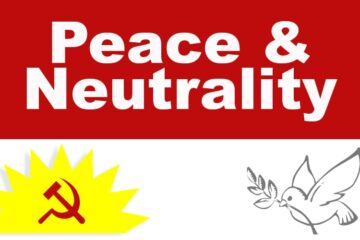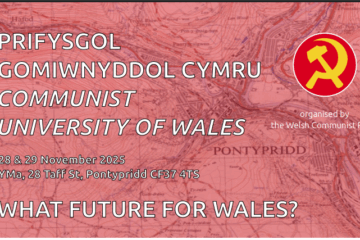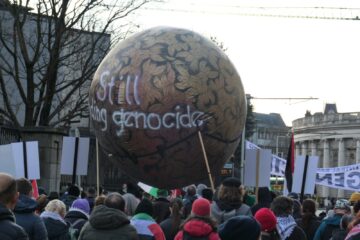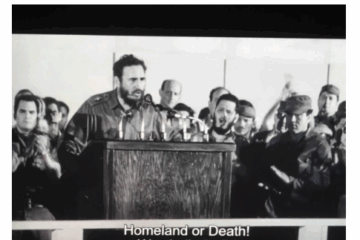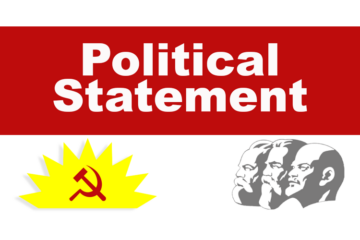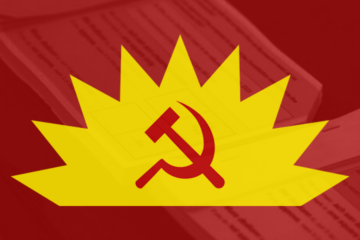Eulogy: John Meehan – 9th July, 2022.
Good Afternoon Everyone, John’s family, friends, neighbours and comrades. We are here today to remember the life of our Uncle John Meehan. Thank you for travelling near and far to be here with us. We appreciate it, as would John.
John was born on June 19th 1936, and raised on a small farm in Cloongowla West, Ballinrobe in Co. Mayo. He was the youngest of five children, with three sisters, Sally, Mary and my mother Nellie, and one brother Pat. His father, Pat, died when John was 5 years old, and his mother, Norah raised the family on her own. There wasn’t much money around, but they managed. John was educated at the convent school and at the Christian Brothers in the Cornmarket . After this he stayed working on the farm for a few years.
Around 1956 he went to London but didn’t stay for long. He came back home and returned to farming in Cloongowla. Even in these early years John had strong convictions. He told me that when he was around 20 he didn’t go to Mass. The local priest came to see his mother, Norah, and gave her a hard time about this. John took it upon himself to visit the priest to tell him to leave his mother alone. The priest in trying to placate John, invited him in and gave him his first glass of alcohol that day. A certain irony in that!
He went back to London in the 1960s. His sister Mary and niece Helen have sent me information about this time of his life. He worked in a variety of jobs:
For British Rail in a ticket office and then as a porter.
He spent one Christmas at the Mount Pleasant post office – the biggest sorting office in the country. He also worked on the Isle of Dogs as a labourer, where a lot of housing was replacing dockland slums. It is now best known as Canary Wharf.
At this time he became friends with Maurice O’Byrne and his son Terry from Waterford, Through them and a woman called Minnie Bowles (known to Helen as Auntie Min), John became involved with the Communist Party. Minnie was secretary to Harry Pollitt, the General Secretary of the Communist Party of Great Britain.
When he had saved enough money he went home and built a new house for his mother around 1966-7. He farmed the land and got a job at an agricultural research institution at Creagh. He was one of 30 men there who worked on the land and they were the first group that he unionised.
Over the years my mother Nellie would often take us over to Ballinrobe to visit Granny Norah and John. I remember him then as a clean shaven, soft spoken, quiet man with a gentle smile. Thinking about it now it must have driven him crazy when a gang of 5 children landed in, tearing around the place, chasing the hens and knocking over cocks of hay, but he never showed it. In fact one of the nicest memories I have is of him bringing us for rides on the donkey and cart, and the fun we had saving hay and turf, the O’Malley’s, Chris, Noel, Jim and Jack often joining us on these occasions.
John was a kind and generous man. The O’Malley’s have told me of how good he was to them and how much respect they have for him. He was also very kind and caring towards his neighbour Bridgie Morahan who lived directly across the road from his house and ran a little shop. She was confined to her armchair and John looked after her. John told me great stories about Bridgie. People used to gather there with her in the evenings, sitting in front of the open fire, playing cards and having great conversations. John told me that one of the best conversationalists was the local parish priest who would come to visit Bridgie. She would produce the whiskey and the conversation would flow. Everyone who knew John has a story to relate of his kind deeds.
In 1970 he went back to the UK when Brian Ward, Mary’s husband, died and he stayed for about a year. He got a job at McAlpines so he became one of McAlpines Fusiliers and helped to lay the foundations of the National Theatre in London.
He told me once that during this time he worked long hours but every now and then he would go AWOL for a few days and spend the time reading everything he could lay his hands on about Trade Unionism and Socialism and the people involved in it. His book shelves in Cloongowla are packed with his reading material and on the walls and shelves there are pictures of his heroes, like James Connolly, Lenin, Marx and memorabilia from his travels to Russia, Cuba, Poland and other places.
After that he settled back in Ireland and got a job as a Water Scheme Caretaker with Mayo County Council. That was when John became very involved in trades unions and travelled the country unionising work forces as well as supporting the cause of small farmers. He was very articulate and delivered some excellent speeches and wrote top class articles to newspapers and letters to politicians.
He was very proud of his involvement in SIPTU Mayo No. 2 Branch, Castlebar and was a National Executive Council Member of ITGWU and SIPTU. Among other achievements, realising the value of education, he was instrumental in setting up a Third-Level Scholarship Fund for children of SIPTU members and for supporting Ballinrobe Development Committee in their efforts to supply housing for the Travelling Community.
His involvement with SIPTU allowed him to travel far and wide for EU business from Brussels to Moscow and Cuba, where he was introduced to cuban cigars, one of his favourite pleasures. He also made a special trip to Auschwitz and to the Somme, both of which moved him very much. He was very involved in the successful campaign to erect a memorial to the memory of Thomas Patten, an Achill man and an Irish Volunteer, who died in defence of The Spanish Republic during The Spanish Civil War.
After John retired he continued to take a strong interest in current affairs and politics. He read books, newspapers and the Socialist Voice which came in the post every month. He loved listening to the radio and music and enjoyed the companionship of his friends when he went to O’Hare’s for a few drinks. His health declined over the years but he was able to stay at home for a long time due to the kindness and help he received from his wonderful neighbours Noel, Josie and Jimmy and carers Bernie and Martha.
He spent the last couple of years of his life in Hollymount Nursing Home. We want to thank Margaret Hayes and the nurses, carers and staff for their exceptional care of John. They got to know that even though he was a man of few words, when he said No, he meant No!! They gave him the space he needed and respected his wishes in a lovely caring way. Thank you for your patience and kindness.
John was a deep thinker, wise and honest to the core. He didn’t suffer fools gladly. He was a man of principle and defended those principles without compromise. He didn’t have children of his own, but he looked out for us. My own children always looked forward to his visits, and when they were very young often used to ask when Santa was going to arrive! We have lovely memories of him sitting at my kitchen table sharing wonderful stories of his adventures.
John, your fond memory will remain in our hearts.
It was a privilege to know you.
By being here today I am carrying out John’s express wishes which in put in writing and Jack O’Connor witnessed. I wasn’t able to do everything that he asked because of Covid restrictions. He wanted his body donated to the Dept of Anatomy at NUI Galway but this couldn’t happen. He wanted his body cremated and his ashes interred in his family plot in Ballinrobe without any religious service. Red flowers only permitted.
He also said and I quote:
“On the occasion of the interment of my ashes, any lay person, if they so desire, may verbally and publicly comment with oratorical eloquence on whether or not in the course of my life, I made any positive contribution through my various activities towards leaving the plight of humanity any better when I departed, than it was when I first entered this unjust and exploited melting pot.”
And with that I now invite Fergal Costello to say a few words.
When Fergal has finished if anyone here would like a share a memory of John please do.
Tribute to John Meehan by Fergal Costello
9th July, 2022 on the occasion of the interment of John’s ashes in the family grave in Ballinrobe.
Salman Rushdie wrote “Our lives teach us who we are”
John’s life tells us who he was. His was a life devoted to helping and supporting others, his family, his friends, neighbours and work colleagues, above all his community. He fought injustice, discrimination and privilege and tried to make society a better place for all. As a true republican he saw everyone as equal citizens and as a true communist he tried his best to eliminate exploitation, injustice, colonialism and improve the lot of all workers.
John never hid his politics. He would always defend his position with skill and good humour and would never try to impose his views on others. He was very well read and was grounded in the history and culture of his county and community. He was slow to give his opinion but when he did it was well thought out and people listened.
I first met John around the time of the Unity Conference in 1970 that formally united communists north and south in the Communist Party of Ireland. John stood out since there were few communists from west of the Shannon and certainly no farmers. I got to know John quickly as we were both active shop stewards in the Irish Transport and General Workers Union. He was great company, loved conversation and had great insights into rural Ireland. When he visited us in Rathmines the kids were in awe of him as his hairstyle, with the bushy side locks and long well tended beard, was straight out of The Onedin Line, a popular sea-faring TV series at the time.
I was aware that John had spent time in England in the fifties. There was no work in Ireland whereas England was experiencing a post-war building boom. Half a million people left Ireland to work in England during that decade. While there John joined the Connolly Association and the Communist Party of Great Britain. He was an active member of the CPGB and sold the Daily Worker on Balham High Street in South London.
I often wondered where John’s radicalism came from. When Anne Casey, a very good friend of his, asked if I would be interested in recording John’s memoirs, I jumped at the opportunity. We met in the West County Hotel on the outskirts of Dublin. It was an enjoyable get together but it became clear early on that there was no way John would commit his memoirs to tape. As his friends will testify, John was a very private person and this was a bridge too far.
Following John’s passing I returned to this question again starting with John’s own family. At the time of the 1911 census the Meehan family, John’s Grandparents and four children were Irish speaking. His grandfather, then 71, had lived through the famine.
From 1845 to 1849 hunger and disease wreaked havoc on the community and on a grossly overcrowded Ballinrobe Workhouse. Trenches were dug at the rear of the Workhouse where the dead were buried daily. In one week alone in 1849, ninety seven inmates died. Those who could emigrated. Many of those who couldn’t, died of hunger or disease.
Michael Davitt was born on the family farm in Straide, north of Ballinrobe, at the height of the famine. When he was four the family was evicted for rent arrears and was forced to emigrate to England. While still young, Michael worked in a Mill, where he lost an arm in a work accident. He was an active and class conscious trade unionist. When he was 24 Davitt was sentenced to 17 years for IRB activity. He was released after seven and a half years following an amnesty for Irish prisoners.On his release, remembering his early childhood, Davitt’s focus shifted to Land Reform in Ireland. Agrarian unrest in the west of Ireland was sparked by the 1879 famine. A combination of heavy rains, poor yields and low prices brought widespread hunger and deprivation. Davitt played a role in the organisation of several large-scale meetings in Mayo to agitate for land reform. At one of the meetings, he called for the liberation of Ireland from “the land robbers who seized it”. On 16 August 1879, the Land League of Mayo was founded in Castlebar and on 21 October it was superseded by the National Land League.
One of the actions the Land League took during this period was the campaign of ostracism against Captain Charles Cunningham Boycott, land agent for Lord Erne (Hugh Adair). Adair owned 20,000 acres in Ireland. Boycott lived in Lough Mask House, on Adair’s estate, outside Ballinrobe. In the autumn of 1880 all labour was withdrawn from the house and estate. No one would harvest Adair’s crops and shopkeepers in Ballinrobe would not supply him or Boycott. They were forced to bring in Orangemen from Cavan and Monaghan to harvest the crops.This campaign led to Boycott abandoning Ireland in December of that year and of course gave a new word to the English language.
In the early 1900s, TB wiped out many poor families in Ireland. Noel Browne, who lived in Ballinrobe as a child in the 1920s, lost both parents and five of his seven siblings to TB. Understandably, this had a profound effect on Dr. Browne’s life and subsequent political career.
All this local inheritance suggests that resistance to oppression, injustice and colonialism was almost certainly built into John Meehan’s DNA. So that when the opportunity arose to give it expression John was ready and more than willing to do so. This he did in the ITGWU, later SIPTU, fighting for improved pay and conditions and in the political field, in campaigns to defend the Cuban Revolution, end the war in Vietnam, overthrow the Apartheid regime in South Africa and demand Civil Rights for all in Northern Ireland, to mention just a few.
In the 1970’s John campaigned to get me elected to the National Executive Council of the ITGWU. During my term in office, at John’s invitation, I represented the Union at the unveiling of a memorial to Michael Davitt in Straide. When I stepped down after six years, John was persuaded to run and was duly elected to the Executive. Afterwards, he would always say to me, with a wry grin, “you handed me the poisoned chalice”. The truth was John was elected on his own merits, as he had huge respect, not just in Mayo, but in the wider Union throughout the country.
John had great contacts, that he never spoke about. Once he handed me two documentary films in large cans that he got from Charles Parker. Parker is renowned for the great radio documentaries he made with Ewan McColl. He also collaborated with documentary film maker Phillip Donnellan and Ewan McColl on a number of film documentaries for the BBC, notably “The Irishmen” about workers, mainly from the West of Ireland, building up Britain’s roads, dams and underground tunnels.
“The currach rots on the Achill Island Tourists walk on the Newport Quay The Mayo boys have all gone roving Digging a tunnel through the London clay Down in the dark are the tunnel tigers Far from the sun and the light of day Down in the land that the sea has buried Driving a tunnel through the London clay”
I viewed the two films in RTÉ. One was about the construction of the Victoria line in the 60’s. It showed lots of Donegal, Mayo and Connemara men working in difficult and dangerous conditions, many of them Irish speakers. Before going down and back they had to spend time in compression and de-compression chambers. The second film was about the land clearances in Scotland, drawing the comparison with the Irish Famine. Two great documentaries, but I failed to get RTÉ to transmit either of them.
Yesterday, I met with a great friend, trade union colleague and admirer of John, Jimmy Jordan. Jimmy applied for a transfer to Mayo on John’s suggestion and spent many happy years serving the members down here in Mayo. Jimmy asked me to convey his deep regret, that he cannot be with us today due to illness. Jimmy was one of those who said “we will have to do something for John” and even though he can’t travel, he has been helping to organise our trip down from Dublin. He has huge admiration for John and how he had such deep roots in his community. He said, “the most important thing to John was to have the respect of his own community”
He was a Ballinrobe man first and foremost and a proud Mayo man and it was from there that he drew his strength, inspiration and radical tradition.
I also spoke, earlier in the week to Francy Devine, of the Union’s Education Division and also of the Irish Labour History Society. In Francy’s History of the ITGWU, he writes very highly of John’s contribution on the National Executive, skillful, measured and strategic. He credits John as the driver of the 1979 Conference in the Imperial Hotel, Castlebar to commemorate the Anniversary of the Founding of The National Land League. This was under the auspices of SIPTU and the Irish Labour History Society. He remembers John having his own special seat in the Valkenburg in Ballinrobe where he would hold forth. If Francy didn’t find him there, he would leave a note on his seat knowing he would get it.
The last time I saw John was in the Nursing Home in Swinford. He was happy there although his memory was fading and he was in a wheelchair. I took him for a spin along the bright corridors and we came across a painting of the Liffey from the Ha’penny Bridge. I pointed out Liberty Hall in the background and the 13th Floor where the Union held Executive meetings.
He didn’t say anything, but gave his customary wry smile. I knew what he was thinking, “you handed me the poison chalice”.
Martin Luther King wrote,
“We start to die the day we become silent about the things that matter to us”
John never became silent about the things that mattered to him and so always remained young in spirit.
Farewell dear comrade John, we all miss you so much. Ní fheicfhimíd a leithéid arís ann.



